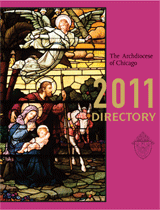Instituto marks 25 years of training Hispanic leaders

A regular feature of The Catholic New World, The InterVIEW is an in-depth conversation with a person whose words, actions or ideas affect today's Catholic. It may be affirming of faith or confrontational. But it will always be stimulating.
Almost half of Catholics calling the Archdiocese of Chicago home are Hispanic or Latino, and that percentage only continues to grow. But this is not something new to leaders.
Since 1984, the archdiocese recognized the need to encourage and form lay leaders in the Hispanic community to help this population thrive in faith and love of Jesus. That year, it started the Instituto de Liderazgo Pastoral, or the Institute for Pastoral Leadership, and since then has graduated more than 1,000 lay leaders who now work in the parishes throughout the archdiocese.
The program is similar to one established earlier in English and also includes formation of the Spanish-speaking deacons. Pastors recommend parish leaders for the program.
Jaime Bascunan, the institute’s director, recently spoke with editor Joyce Duriga about how the program has grown and changed over those 25 years.
Catholic New World: What changes in the formation of Hispanic leaders have you seen over the last 25 years?
Jaime Bascunan: The main change is that there is more need now than there was before. We’re coming close to half of the number of Catholics in the Archdiocese of Chicago being Hispanic.
The curriculum has changed a bit but the methodology and theology is still the same. In response to the reality and the way of learning of people in the Hispanic community, the curriculum has been enhanced because of the reality of the Hispanic experience.
At this time in history it is more demanding. We have to raise the standards because there are more elements that need to be included in Hispanic formation.
CNW: How has Hispanic ministry become more demanding?
Bascunan: Our communities are not just looking for being welcomed in the parish. They are really and truly developing their sense of “We are the church in the United States.” We aren’t just guests. We are part of the whole church.
And having come to that understanding, they feel they have to develop themselves. For that they need their own leadership. At the same time they are becoming more multicultural in the parishes. Those people who are preparing within the Hispanic community, they are also going to work not just with Hispanic, but with Anglos, sometimes with Filipinos, with Polish.
The communities are becoming more diverse and they need to be prepared, especially the deacons. They have to be prepared to work with everyone in the parish. In the archdiocese there are over 140 parishes with Hispanic ministries. All of them are very diverse.
It’s the same for the deacons. We ordain the deacons within the context of the Hispanic community. We train them within the Hispanic culture so that they are well formed and grounded in their faith so that they can go out and work with people of various cultures. So that they don’t feel threatened and they know how to cross over to different cultures and experiences.
We try to empower people to not just stay within their community but to go out — after they know themselves and who they are.
CNW: Are we getting better, as Catholics, at working together within our various cultures?
Bascunan: I think so. Everyone is on the same page with what we’re doing. The pastors. The faculty. It’s not just a mission coming from the administration but it is something coming with the administration, with the pastors, with those people who have experienced working with the Hispanic culture. The program is very much in touch with what is going on on the ground, in the parishes.
CNW: We often hear of the need for the Catholic Church in the United States to reach out to Catholic Hispanic immigrants so that they feel welcome here and don’t leave the fold to find God in other denominations. How do we do that?
Bascunan: It’s a long answer. We need to take in account where the people are coming from. Not necessarily in terms of country or places but in terms of faith and how people express their faith and celebrate. In terms of how people learn and relate to each other.
If we don’t speak to that and we’re just teaching the catechism or Catholic doctrine or some theological aspect then we’re not connecting with the people. We’re not connecting with the life of the people.
I think there is a genius that we take that seriously at the instituto. So when our leaders go out, they feel equipped enough to welcome others. Perhaps they have a faith or a popular piety. And they can pick up that and they can articulate and teach through that experience.
I think we are doing it. And I also think there is much more that we can do.




